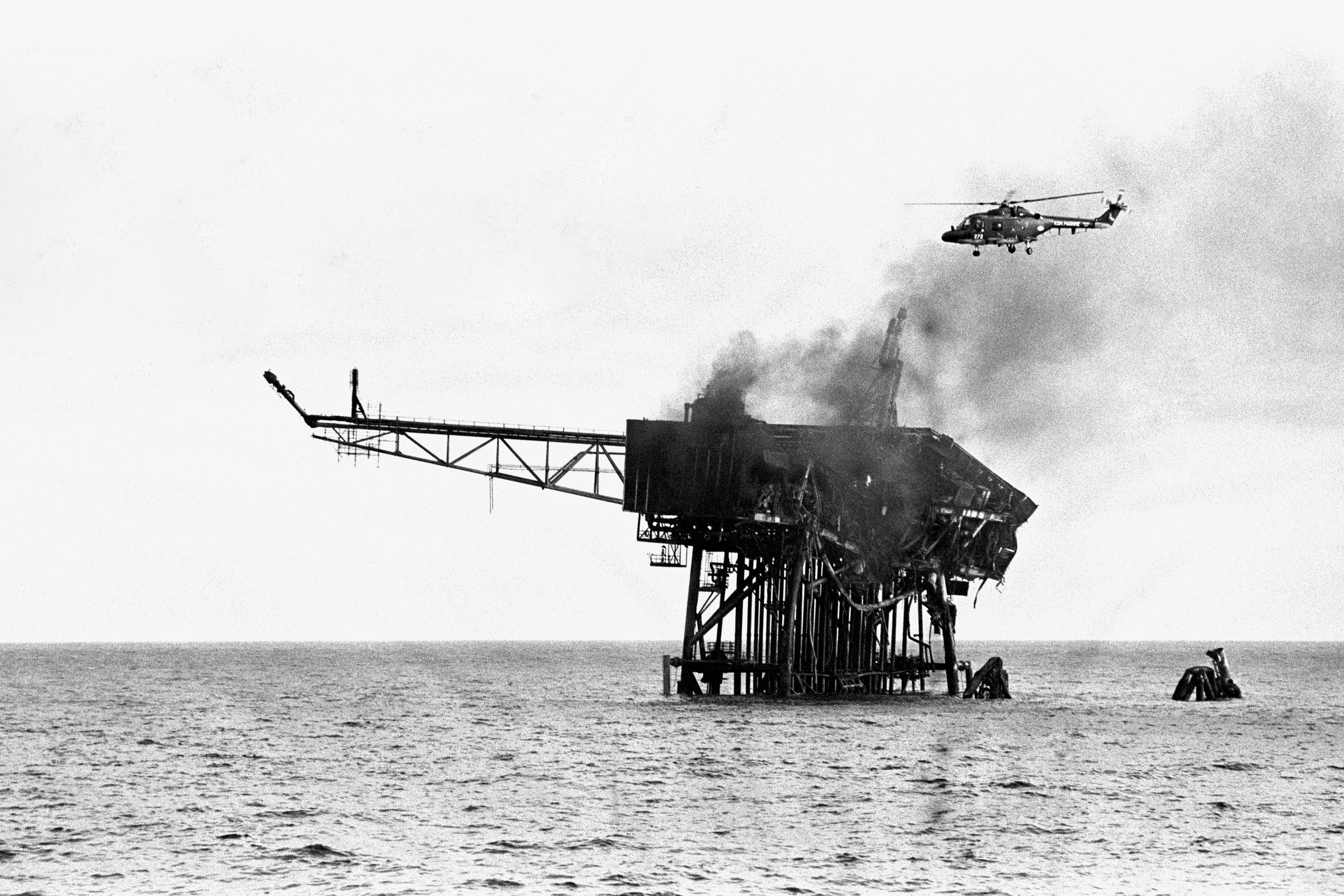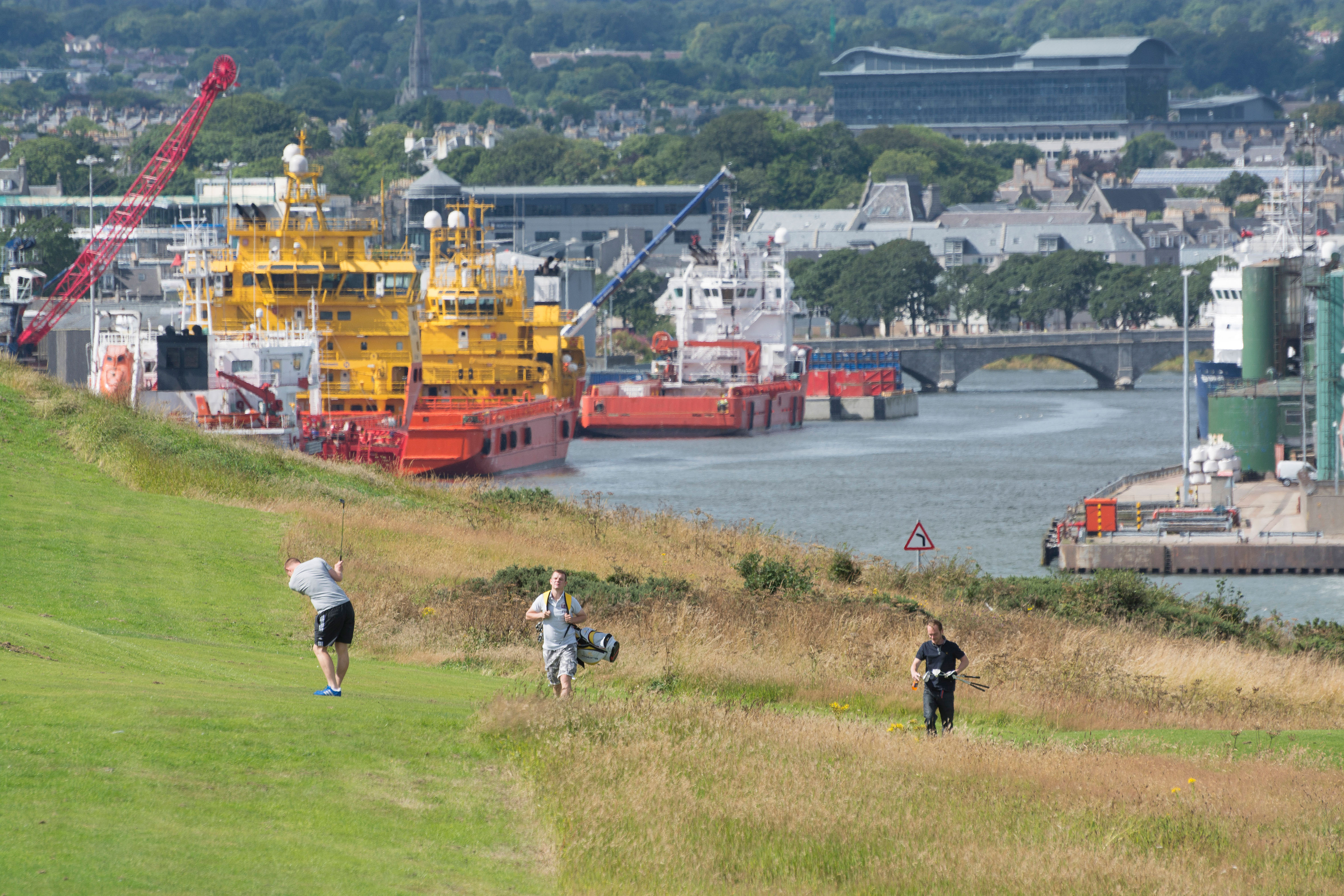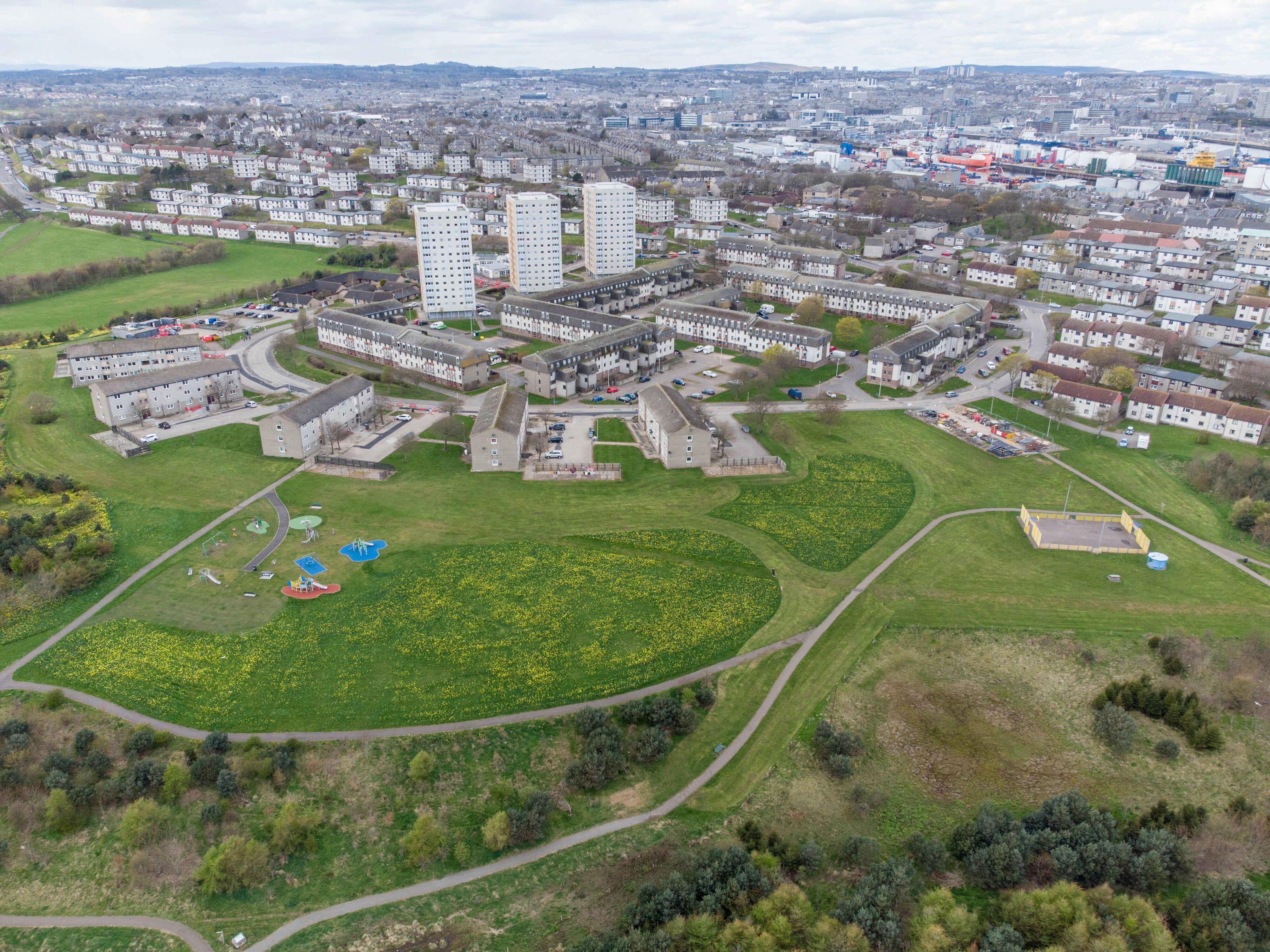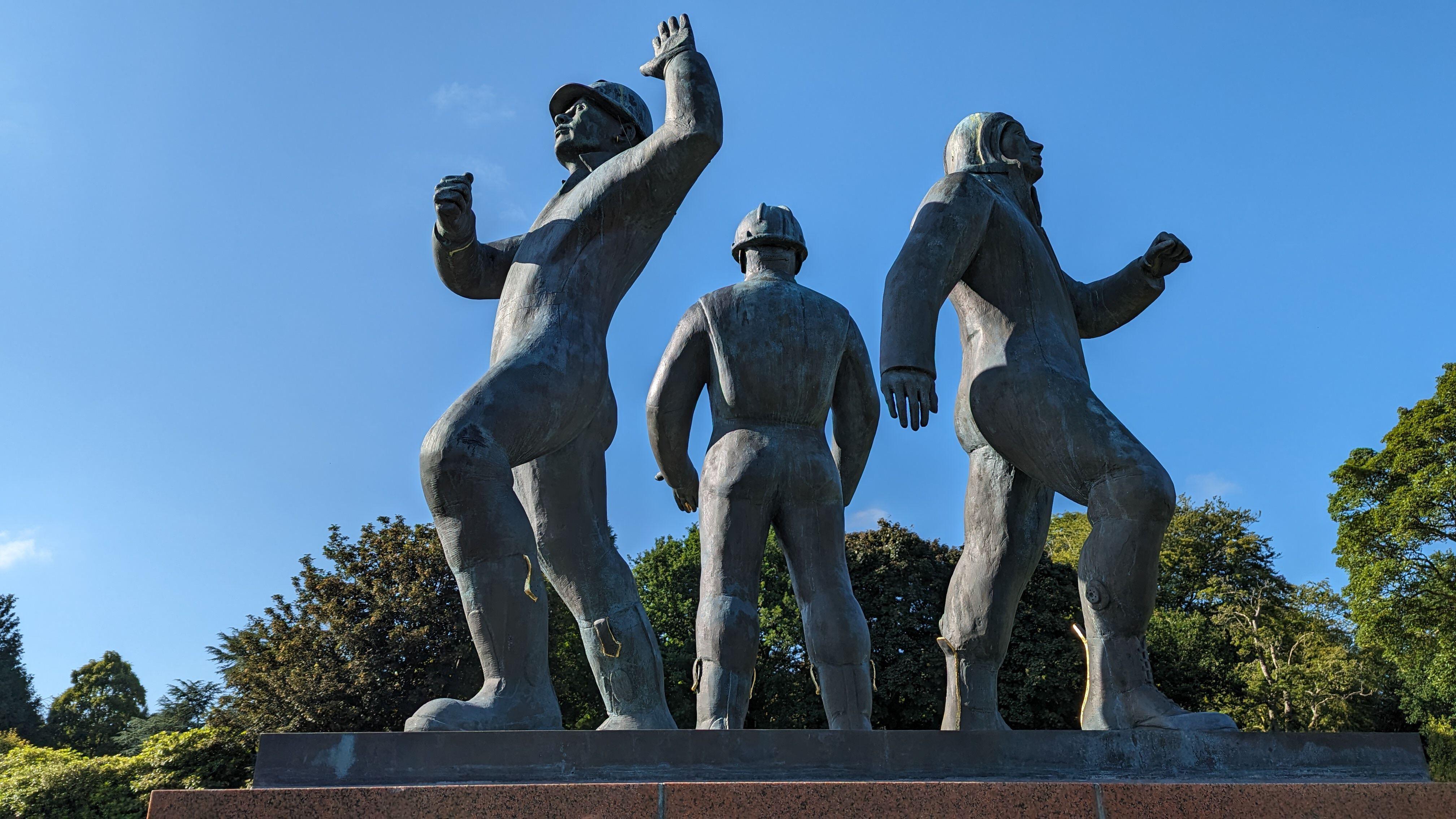GB Energy: 'It has to come to Aberdeen – where else could it possibly go?'
Piper Alpha was one of the defining moments of my childhood. I was 10 years old when it happened, living in a town 35 miles north of Aberdeen, but I remember it vividly. It seemed like half the town worked offshore and when the platform exploded, killing 165 men and two of the crew who went to rescue them, everyone knew someone who was affected. The cool older girl whose family lived a few doors down from mine lost her fiancé. I can still see him roaring up in his fancy red car; the image of her running from her house in tears has never left me.
I had wondered if I’d misremembered the impact the disaster had across the north east, if I’d read too much into a memory it turns out I hadn’t quite got the detail right on – it was his house I’d seen her running out of, not her own. But conversations I’ve had with others who were growing up in and around Aberdeen at the time confirm that they remember it in the same way. From Turriff, where I grew up, to Oldmeldrum, Stonehaven, Ballater and the city itself, the sense of having lived through something that was collectively traumatising is real.
“It definitely felt like something REALLY big in the community,” one friend texts when I ask what he recalls. Another remembers that, with so many in the north east working on the rigs, it felt like the whole area was pervaded with a real “it could have been me feeling”, while a relative says she was “definitely affected” by the sense she was growing up in “a dark period”. A former colleague sums it up when he emails to say “certainly, you were a stone’s throw from someone who worked offshore so it was a bit like a mine disaster in Ayrshire or something – existential”.
 The Piper Alpha platform exploded in July 1988, killing 165 workers and two of the crew that went to rescue them | Alamy
The Piper Alpha platform exploded in July 1988, killing 165 workers and two of the crew that went to rescue them | Alamy
That deep regional entanglement with the offshore industry has been a feature of the north east since oil started being extracted from the North Sea in the seventies. It brought many high-paying jobs and, while workers came from across the UK and overseas as well as the local area to fill them, the local economy – not just in Aberdeen, but in a huge section of the surrounding area too – boomed. But after every boom there eventually comes a bust and, since the oil price crash of 2014, the region has been suffering. In a report released earlier this year, urban policy think tank Centre for Cities said the decline of oil and gas has “rippled through Aberdeen’s economy”, with the city being one of only two in the UK to have fewer jobs in 2023 than in 2010. Local services have borne the brunt of the decline, with the retail sector hit particularly hard – the number of retail jobs plummeted by 30 per cent over the period against a national average of just six. Gross domestic household income – the amount of money people have to spend in the local economy – fell by seven per cent, from £23,947 to £22,157.
It looked like Labour leader Keir Starmer was going to throw the area a lifeline when he announced last year that, should his party win what was then just an anticipated general election, the publicly owned energy company he had promised at Labour’s 2022 conference would be headquartered in Scotland. Little detail of the initiative was provided but Starmer made it clear that he wanted the organisation – GB Energy – to play a leading role in the energy transition. Given Aberdeen’s status as the energy capital of Europe, its deep ties to the sector, and its demonstrable expertise in both old and new, clean and dirty, energies, there were high hopes that it would be based there.
 Keir Starmer uses a June 2023 visit to Leith to announce his intention to headquarter GB Energy in Scotland should he become prime minister | Alamy
Keir Starmer uses a June 2023 visit to Leith to announce his intention to headquarter GB Energy in Scotland should he become prime minister | Alamy
But, despite confirming GB Energy’s launch when his party took power in July, Prime Minister Starmer has yet to specify where its HQ will be based and north east optimism has turned to dismay. Aberdeen & Grampian Chamber of Commerce has become so cross about the issue – and the fact Labour is pressing ahead with an energy profits levy it has been warned will drive clean-energy investors away and a ban on new drilling it has been told threatens both jobs and the transition – that local councillor Tauqeer Malik, leader of Aberdeen City Council’s Labour group, has hit out. Speaking in July, he said the group’s “negativity” would make it “extremely difficult” for the government to have “confidence with businesses” in the city.
In early August I come to Aberdeen to find out why, when so little is known about GB Energy, feelings about it are running so high. On a gloriously sunny day I meet SNP Westminster leader Stephen Flynn for an al fresco coffee above the recently redeveloped Union Terrace Gardens. At one time the sunken Victorian park was such a blight on the city centre that local businessman Sir Ian Wood, an oil industry veteran who has turned his attentions to the energy transition in recent years, wanted to pay to have it paved over. After endless debate and a £30m facelift, it finally reopened at the end of 2022 and the gardens and adjoining terrace are once again a civic space the city is taking pride in.
 Union Terrace Gardens have been revamped as part of a £30m regeneration project | Alamy
Union Terrace Gardens have been revamped as part of a £30m regeneration project | Alamy
Flynn turns up for our meeting in black shorts and shades, every inch the wannabe rockstar his Commons appearances mark him out to be. Back in the pre-election days, when the SNP still got a weekly question at PMQs, his contributions were full of eye-catching gotchas, but it is a much more thoughtful politician that tells me why, with Starmer positioning GB Energy as vital to the energy transition, he feels Aberdeen is the ideal place for it to be based.
“I’m not entirely sure what GB Energy is going to be – we need to get a better understanding of what it is they’re going to create,” he says. “But if the UK Government is putting its weight behind an entity like this then of course we want that to be located in Aberdeen. It’s best placed because of the history of the energy sector – we’ve got the legacy of 50 years of skills and experience and we’ve got world-leading companies, particularly in the sub-sea sector, ready to deliver the next generation of workers. I don’t think anyone could reasonably compare Aberdeen to any other place, and if GB Energy is going to play a key role in the energy transition then it will impact Aberdeen more than anywhere else because it’s the jobs in Aberdeen that are going to change. That’s an argument that nowhere else can put forward.”
Later I meet with North East Tory MSP Douglas Lumsden and he tells a similar tale. Like many people in the area Lumsden has deep ties to the energy sector, not just because he worked in it prior to entering politics but because his uncle was one of the 61 workers who was on Piper Alpha and survived. His uncle was, Lumsden says, “a completely different person” afterwards and, although he never spoke to his family about the experience, his appearance in the BBC documentary Piper Alpha: Fire in the Night – made to mark the 25th anniversary of the tragedy – shows how hard he found it to come to terms with. Sitting as a model for the sculptor who created a memorial statute to the disaster helped.
Piper Alpha is ingrained in the DNA of Aberdeen, it absolutely still is
“Everyone knows someone who was affected by Piper Alpha and the government should be more mindful that it’s a price we’ve paid to keep our lights on and our cars running and the economy going,” Lumsden says. “More clarity on what GB Energy is would be good, but if it goes anywhere else it will be a complete betrayal of the north east. At present we’re the energy capital of Europe so if the government chose to put it anywhere other than Aberdeen it would be a complete disgrace. It would be a slap in the face to everyone in the north east.”
Politically, Aberdeen is something of an oddity. Historically a Labour stronghold that has fallen for the SNP’s charms in recent years, it stands out as the only major UK city not to stay or turn red at this year’s general election. Yet while the electoral map shows a yellow city surrounded by a blue shire – Flynn held onto Aberdeen South and party-mate Kirsty Blackman retained Aberdeen North while the Tories held Gordon and Buchan and West Aberdeenshire and Kincardine – they are not typical yellows and blues. Indeed, while the SNP seems to be softening its position under John Swinney, Flynn is at odds with the party on its stated opposition to further North Sea drilling, saying any enforced reduction in North Sea production must go hand in hand with incentives to invest in renewables and the impact any of it has on jobs has to be factored in. “It all needs to be looked at holistically,” he says.
The Tories, meanwhile, were the only party in attendance when Unite the Union staged a ‘No Ban Without a Plan’ protest in Aberdeen in July. Unite general secretary Sharon Graham has slammed Labour’s stance on drilling and windfall taxes as “irresponsible”, saying it will lead to workers being “thrown on the scrapheap”. In a move that is difficult to compute, the union is, effectively, campaigning against Labour in the city and the Tories have taken the party’s favoured place. Former Aberdeen councillor John Wheeler, who works in Lumsden’s office and took 11,300 votes to Flynn’s 15,213 when he contested Aberdeen South in July (Labour’s Malik came second on 11,455), posted photos of himself at the protest on X. “Unite for a worker’s economy”, the banner he is standing next to in one of the pictures says; “delighted to attend @unitetheunion event today”, Wheeler wrote.
Just how odd the politics of Aberdeen is was brought home to me last summer when I came north to meet local councillor Barney Crockett. A longstanding Labour member who had worked offshore in the days when oil companies flouted safety regulations and the UK Government, by failing to regulate, let them, Crockett had quit the party in disgust after Starmer made it clear any government he led would block all new domestic oil and gas developments. “It’s a spectacular failing in the UK context because the oil and gas companies are going to discontinue their work in the UK and the North Sea,” he told me, adding that without those companies and the fuels they produce there can be no energy transition, only a cliff edge.
There’s a lazy construct that compares us to Norway but Norway’s had long-term fiscal stability
When we meet in Aberdeen Town House this year, Crockett tells me his worst fears have been realised, with Starmer’s government not only pressing ahead with its drilling ban but with the energy-profits levy – the so-called windfall tax Labour says it will use to pay for GB Energy – too. Proponents say a similar levy imposed in Norway has been successful, ensuring the most polluting companies are taxed on their fossil-fuel activities while making money available to pour into renewables. Between 2016 and 2021 more than €600m of public money in Norway was spent on research and development investments in renewable energy technologies, according to Statistica, while last month the country’s sovereign wealth fund, Norges Bank Investment Management, committed €900m to investment firm Copenhagen Infrastructure Partners’ latest renewable energy fund. But the difference between the UK and Norway, Crockett stresses, is that the latter offers investment incentives to ensure the companies it taxes put money into developing renewable technologies while the UK does not. In other words, Norway is using a carrot and stick approach to drive its energy transition while in the UK there is nothing but stick. Lumsden and Flynn, whose parties respectively introduced and supported the windfall tax, agree it is counterproductive.
I come to see Burness Paull energy lawyer Bob Ruddiman in his firm’s shiny new office in Marischal Square. Like Union Terrace and the adjoining gardens, the complex is part of the piecemeal regeneration the city has seen in recent years and speaks to the pockets of optimism that remain there. Ruddiman has been advising on energy sector deals for decades, regularly guiding clients through complex transactions that span multiple jurisdictions. He says that, contrary to the popular belief hammered home by populist politicians, the energy sector is not full of climate deniers who want to ravage the North Sea and squeeze every drop of oil they can from it, but rather of pragmatic organisations that have the knowhow – and the will – to drive the transition to net zero forward. The thing that’s stopping them, he says, is a fiscal and regulatory environment that is at best shortsighted and at worst doomed to fail.
 Parts of the Torry area of Aberdeen were bulldozed in the 1970s so the harbour could be expanded at oil companies' behest | Alamy
Parts of the Torry area of Aberdeen were bulldozed in the 1970s so the harbour could be expanded at oil companies' behest | Alamy
“There’s a lazy construct that compares us to Norway but Norway’s had long-term fiscal stability,” he says. “It has high taxes but it also has generous allowances and that’s given investors certainty – they are continuing to invest in new oil and gas and in expanding renewables. Energy policy and the scale of the investment required needs to transcend party politics because you can’t invest in energy projects along electoral timelines. The problem we have for attracting investment is that successive governments north and south of the border have failed to commit to long-term energy policies or stable fiscal and regulatory regimes. There are significant investments ongoing but there will be lots of investors pausing to see what the rhetoric looks like in terms of enacted law.”
And as long as that pause continues there can be no energy transition, never mind a just one. Quite what the term “just transition” means varies depending on the political persuasion of the person you are talking to. For those at the Just Stop Oil end of the spectrum it means addressing the climate emergency by moving away from fossil fuels as quickly and as completely as possible. For those at the OEUK end, where the term “homegrown transition” is preferred, it means pouring enough investment into domestic companies of all shapes and sizes to make sure the UK can hit net zero without having to rely on energy imports. Either way, University of Glasgow social historian Dr Ewan Gibbs says it has been widely adopted in Scotland because it “applies well to our collective memories of what happened in coal mining, steel and shipbuilding”.
It also applies well to what happened in Aberdeen when the city transitioned into oil and gas, because the process then was far from just. Areas like Torry, which is among the city’s most socially deprived, saw great swathes of housing – the kind of quaint fisher housing that has turned nearby Footdee into a picture-perfect tourist draw – bulldozed so the harbour could be extended at the behest of oil giants like Shell. And, while the oil boom brought great wealth to the region, not everyone benefitted. Indeed, the city’s oil workers may have had money to lavish on everything from fancy restaurants to expensive houses, but those not working in the sector did not. That didn’t stop them being hit by higher prices when the local economy started to overheat. It also didn’t stop them being left behind to face the consequences when oil price crashes drove those who benefited most from the sector away from the area during periods of bust.
I’m reluctant to think there will be that much to it because the income flow is predicated on the tax on oil, but if it doesn’t come here it would be a tombstone for Aberdeen
For Dr Daria Shapovalova, co-director of the University of Aberdeen’s Centre for Energy Law, it should serve as a cautionary tale. Her work emphasises that for the energy transition to be just it must have a positive impact on entire communities, not just the workers transitioning into new jobs, and she says locating GB Energy in Aberdeen would be an important step towards achieving that.
“GB Energy has to come to Aberdeen – where else could it possibly go?” she says. “We have the expertise but we need to develop the political acumen here. We can’t have decisions about the north east being taken so far from Aberdeen any more. If it’s not here it would exacerbate the feeling that we don’t control anything that directly impacts our lives. Here, energy is not an abstract thing that people see on TV – they see it from their windows, but it also dictates whether they can have a holiday or put food on the table.”
Despite the rhetoric, Shapovalova says there are already signs that the transition will not be just, with Aberdeen City Council recently giving the go-ahead for a park on the edge of Torry to be built on to create the Sir Ian Wood-backed Energy Transition Zone (ETZ). The private-sector, not-for-profit organisation’s vision is for a ‘cluster’ of clean energy businesses to work side-by-side with Aberdeen’s recently opened South Harbour. It wants to build on the park as it is literally across the road. Local people are up in arms and have taken their fight to the Court of Session, where an appeal is ongoing. Shapovalova says they are right to have done so.
“The park is the only green space the community in Torry has and there’s already a large waste incinerator nearby,” she says. “Life expectancy in Torry is about 13 years lower than in the whole of the city and local GPs have signed a letter asking for the park not to be taken away. I don’t think a just transition can happen in Aberdeen if St Fittick’s Park is changed to the ETZ.”
 Permission has been given for St Fittick's Park, a green space in an area of high multiple deprivation, to be built on to create Aberdeen's Energy Transition Zone | Alamy
Permission has been given for St Fittick's Park, a green space in an area of high multiple deprivation, to be built on to create Aberdeen's Energy Transition Zone | Alamy
Crockett takes me on a drive through Torry, up past the Balnagask area where he grew up (and where the local authority will, two weeks after my visit, decide to rip down 500 homes affected by Reinforced Autoclaved Aerated Concrete) and on to the South Harbour. I’d first been here in 2022, when the harbour was still under construction, and wanted to see if any progress had been made on the ETZ. On the way we pass St Fittick’s Park and I ask him why, if the public and private sectors in Aberdeen really are so committed to contributing to a transition that’s just, he and his fellow councillors waved the St Fittick’s development through. He says that, more than a decade on from the oil sector crash and with the North Sea in terminal decline, they felt the situation in the city was so dire that the benefits outweighed the costs. For Shapovalova, another reason for locating GB Energy in Aberdeen would be to make it harder for such decisions to be taken in the future.
Before I leave Aberdeen, I head to Hazlehead Park to visit the Piper Alpha memorial it is home to. The vast rose garden that was planted in the aftermath of the disaster is still in bloom and, as I approach the centrepiece sculpture that Lumsden’s uncle sat for, I see the names and ages of every man who was lost engraved on its base. I catch my breath when I realise just how young my childhood neighbour’s fiancé was when he died, that if he’d lived he would only be 60 years old today.
It may be 36 years since the tragedy occurred but the wound it inflicted on Aberdeen remains fresh. Political cycles have come and gone and institutional memories have faded, but for the people of this area Piper Alpha is very much still recent and raw. It is no surprise that when recent plans to redesign the memorial garden – which for the families of the 30 men whose bodies were never recovered is the closest thing they have to a grave – met with such opposition that Historic Environment Scotland ended up listing the sculpture at its centre. Or that a festival scheduled to take place in Hazlehead Park on 6 July this year – the same day the 36th anniversary of the explosion was due to be marked there – was rearranged amid a flurry of disbelief it had been given the go-ahead in the first place.
After visiting the garden I call Jake Molloy, who last year called time on a 25-year stint as RMT’s regional organiser for Aberdeen. Prior to taking on the union role Molloy spent 17 years working offshore, and was on board the Brent Delta platform on the night Piper Alpha happened. The disaster brought home to him just how dangerous an industry he was working in and he went on to become a leading health and safety campaigner, playing an active role in setting the high standards that have been replicated around the globe. The fact that Aberdeen bore the brunt of the trauma inflicted by Piper Alpha doesn’t mean the city deserves to be given GB Energy, he tells me, but the role the city played in the tragedy’s aftermath shows why it should be given it.
 The Piper Alpha Memorial in Aberdeen's Hazlehead Park | Alamy
The Piper Alpha Memorial in Aberdeen's Hazlehead Park | Alamy
“Piper Alpha is ingrained in the DNA of Aberdeen, it absolutely still is,” he says. “It brought home to the whole Aberdeen area that the city was on the frontline in the event of a major disaster. But there were positives that came out of it. The whole concept of post-traumatic stress was born out of that event – a lot of studies were done by doctors at ARI [Aberdeen Royal Infirmary] and there were incredible learnings. Then there was the Cullen Inquiry in Aberdeen and the outcomes of that set the safety standard for global operations.
“As things are, we’re on the edge of an abyss for Aberdeen and the region. The changes that occurred as a consequence of Piper Alpha, and the centre of excellence that developed as a consequence of Piper Alpha, dictates that the centre of excellence should be retained in Aberdeen. It’s indisputable that there’s linkage there. Piper Alpha and the loss of 167 lives dictated a significant change in the industry – the development of the industry – and as a consequence we’ve continued to grow technology and skills.”
A few weeks after my visit to Aberdeen the Department for Energy Security and Net Zero starts advertising GB Energy jobs, posting adverts on LinkedIn for engagement lead and project development roles. Aberdeen-based newspaper The Press & Journal, which at the beginning of the year branded Starmer and co “traitors” when they confirmed their windfall-tax plans, is ecstatic. Under the headline ‘GB Energy on hunt for Aberdeen staff’, the paper says the recruitment drive “raises hopes Granite City will be named HQ”. The small print of the ads shows the government is on a fishing exercise, though, with the location of each of the jobs given not only as Aberdeen but Birmingham, Cardiff, Darlington, Edinburgh, London and Salford too. In terms of ensuring the talent pool it can pick from is deep and wide, the department’s strategy is a sound one, but it hardly shows faith in the expertise already sitting in Aberdeen.
At the end of August energy minister Michael Shanks – whose Rutherglen and Hamilton West by-election campaign Labour’s headquartered-in-Scotland announcement was designed to boost – visits Aberdeen too, where he says that further detail on GB Energy will be announced when MPs return from recess in September. His Great British Energy Bill will be one of the first items of business and Labour MPs are under a three-line whip to attend the debate. For now, though, there remains little detail about what GB Energy is or what it is going to do. The job ads are peppered with references to a “new, exciting and fast-paced team” that will play a “key” role in “binding together the work of the Great British Energy Programme”, but when it comes to the organisation itself, they say only that it is “a new publicly owned energy company that was a centrepiece of the Labour manifesto”. Starmer and his chancellor, Rachel Reeves, have said they will fund it with the proceeds of their windfall tax, but how much money that will generate is unclear given the impact their policies are expected to have on operations in the North Sea. Whether it will be a full-scale generation company or a small-scale investment vehicle remains to be seen.
Still, the feeling in Aberdeen is that even if GB Energy doesn’t amount to much, it’s what it symbolises that counts. Putting it in Aberdeen would show the government values the city and the sector and the role they can play in the energy transition; putting it anywhere else would show it does not. As Crockett says: “To me, it’s like the woman on the front of the Rolls-Royce – it’s a badge that says we’re still an energy capital. I’m reluctant to think there will be that much to it because the income flow is predicated on the tax on oil, but if it doesn’t come here it would be a tombstone for Aberdeen.”
Holyrood Newsletters
Holyrood provides comprehensive coverage of Scottish politics, offering award-winning reporting and analysis: Subscribe